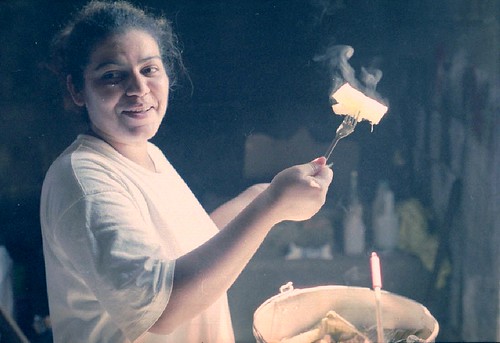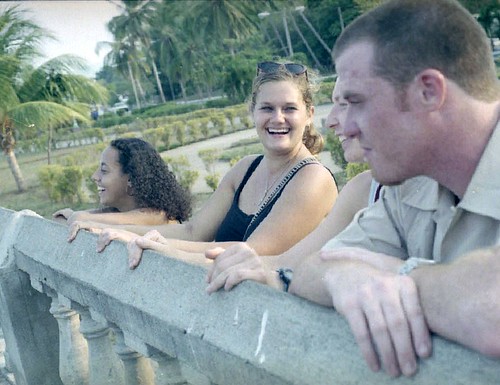While cleaning out my computer's hard drive the other day, I came across this essay I wrote about my experience volunteering in Nicaragua with the Foundation for Sustainable Development. Unlike most "volunteer" programs, you are actually expected to do work, and since I had a bachelor's degree in psychology, I was a psychologist!
More difficult than the work, however, was fitting in. This essay discusses how I finally managed to do that.
- - - - - - - - - - - - - - - - - - - - - - - - - - - - - -
I am 5’9”, blond, and have blue eyes. I could not look more different than Nicaraguans. The average Nicaraguan woman is 5’2”, brunette, and somewhat rotund from the deep-fried foods that are consumed with abandon. The average Nicaraguan man can’t be taller than 5’5”!
During my four month stay in Nicaragua, I could not have become more painfully aware of these simple physical differences. However, I found that the barrier to “fitting in” wasn’t the presence of the physical differences, it was my attitude towards them. I had to accept that I was different and acknowledge that I would never be able to camouflage myself. Only then was I able to feel and act like I really belonged.
The first few days in Nicaragua were the hardest. I was literally a fish out of water, tossed into a hot, dry, and worn-out land when I was used to a cool, placid, and plentiful ocean. Every molecule in my body screamed to be back where I could breathe! My previous world, the one where all of my friends and family still lived, seemed incredibly and unbearably far away.
After my vision cleared and I learned how to breathe, it became evident exactly how different I appeared. The people of Nicaragua (men especially) did their part to remind me as well. “Hey muñeca.. chela… ¿que pasa?” [Trans.: Hey doll.. whitey.. what’s up?]
appeared. The people of Nicaragua (men especially) did their part to remind me as well. “Hey muñeca.. chela… ¿que pasa?” [Trans.: Hey doll.. whitey.. what’s up?]
Everywhere I went, people pointed and commented. More than once, children poked or slapped any part of my body that they could reach, to see if the “doll” was real. With all of these constant reminders, how could I help but concentrate on how different I was than “those people”?
Spending time with Aimee, a tall, blond Peace Corps volunteer who had been living in Nicaragua for over a year, helped me both acknowledge and accept my physical differences. She had learned to laugh, saying “When the two of us living, breathing muñecas walk down the street together, they just don’t know what to make of it! We’re unbelievable!” At that point, I spoke Spanish like a native Nicaraguan. I was so brown I looked like a sorority girl who had fallen asleep on her tanning bed. But I was never going to look like I belonged.
Looking back on my trip, I realize that this was the turning point. After I accepted my physical differences, I made a few Nicaraguan friends. More than one told me, “You’re different than the other gringos. You speak, you listen, and you understand.” We talked about music, parents, favorite foods, best friends, and what exactly the mayor was thinking when he proposed dumping the city’s trash in the nearby volcanic crater.
I will never take for granted how much easier life is when you physically fit in. I will never forget that in order become part of a culture different than your own, you must acknowledge that you are a fish and everyone else a mammal.
This is not exclusionary, pessimistic, or close-minded.
Robert Reich, who at 4’9” is one of the shortest politicians out there, starts every speech with a joke about his height. By acknowledging his physical difference, he makes it possible for everyone to stop concentrating on his stature and start concentrating on what he has to say.
Once you get the elephant in the room out of the way, it is possible to start forging friendships, really learning what it’s like to live within the new culture, and creating an experience that you will never forget.

Nora, Aimee (the Peace Corps volunteer) and two of her friends at a park in Granada. The photo is a scanned in negative because back in 2003 I didn't have a digital camera.
Related Posts: International volunteering for teens; Food prices are rising; Chinese Earthquake - How to help; Global volunteering; Gap Year
Photos courtesy of Casey.
 appeared. The people of
appeared. The people of 
1 comment:
It is interesting that sometimes you have to step out of one's own enviorment to see how other people perceive you, specifically when you are "different".
One of my favorite authors, Beverly Tantum says if you were to fill in the blank, "I am _________ ", more than likely you would only fill in the adjetives that others see you as, or more importantly the ways you are different.
For example, females are more likely to fill it in as "I am female" where as males are not. Any ethnic minority is more than likely to put their ethnicity where as the ethnic Majority are probably not going to have it as a descriptor.
Post a Comment